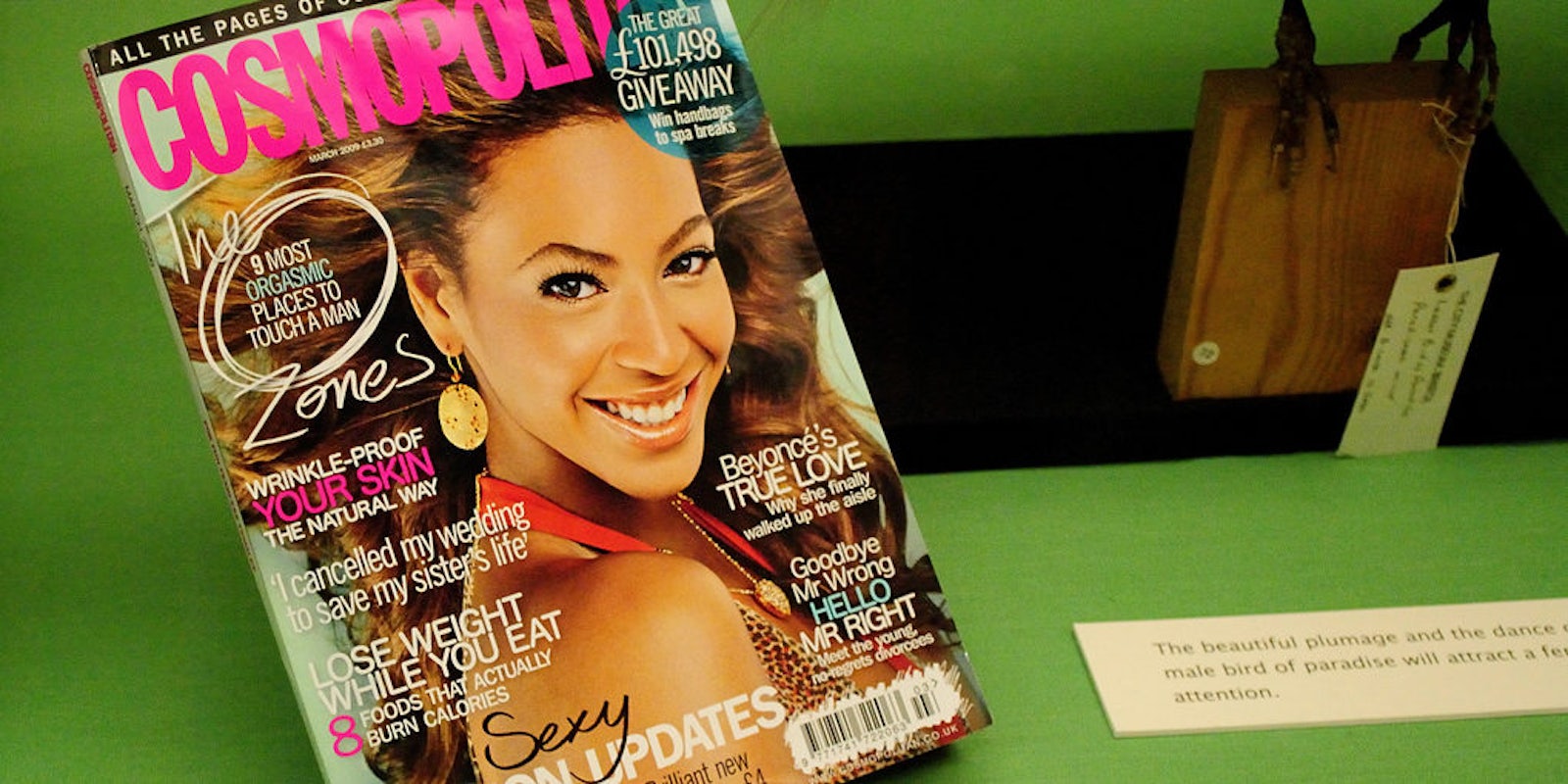Opinion
Cosmopolitan has long been known for its coverage of fashion, women’s health, and real talk about sex. But Walmart shoppers won’t be able to discreetly pick up the magazine at the checkout aisle any longer. The company is removing the magazine’s premium aisle placement in all of its 5,000 stores.
“Walmart will continue to offer Cosmopolitan to customers that wish to purchase the magazine, but it will no longer be in the checkout aisles,” Walmart said in a statement obtained by NPR. “While this was primarily a business decision, the concerns raised were heard.”
Interestingly enough, an organization called the National Center on Sexual Exploitation took credit for the change, arguing that Cosmopolitan is “sexually exploitative” and “targets young girls.” Pulling Cosmo from store shelves, it claimed, was inherently linked to #MeToo.
“This is what real change looks like in our #MeToo culture, and NCOSE is proud to work with a major corporation like Walmart to combat sexually exploitative influences in our society,” Dawn Hawkins, the executive director for the NCOSE, said in a press statement. “Walmart’s removal of Cosmo from checkout lines is an incremental but significant step toward creating a culture where women and girls are valued as whole persons, rather than as sexual objects.”
Walmart pulls “Cosmopolitan” from checkout lines. @jolingkent explains why pic.twitter.com/tYlsNnApo6
— TODAY (@TODAYshow) March 28, 2018
On the surface, NCOSE sounds like a women’s rights organization pushing for an end to sexual exploitation by men. But the center’s history betrays its feminist claims.
Originally founded as Morality in Media, NCOSE was created by a group of Christian and Jewish clergy members concerned with children’s access to adult material. Evangelical Republican Rick Santorum previously expressed support for the group, and its former president, Robert Peters, once suggested a link between gay marriage and mass shootings by warning that America is a “post-Christian” society. NCOSE has even supported the “anti-sex trafficking” bill SESTA, despite ongoing criticism from sex workers, who argue the bill will destroy their livelihoods.
NCOSE claims Walmart’s policy change is “part of our continued work to change corporate policies.” Its power over Walmart is cause for concern as its picking and choosing for Americans what is moral and what matters—and it’s saying women’s heath and sexuality are not.
Worse, Walmart isn’t just America’s biggest retailer—it’s also incredibly popular among marginalized Americans. According to InfoScout, Black and Latin American shoppers are more likely to shop at Walmart, as are Americans that make less than $20,000 each year or have no college education. A 2016 report from Business Insider further confirms that around three-quarters of Walmart’s shoppers are women, over one-fourth are people of color, and nearly a quarter make $20K or less each year.
Marginalized Americans are also reading Cosmo. According to the publication’s print and digital 2018 demographic profile, just over half of its readers make $50,000 or more, and only 65 percent have been to college. 22 percent of the publication’s readers are Latin American, too. While privileged people may make up a huge portion of Cosmo’s readership, plenty of readers don’t come from wealthy, white, middle-class backgrounds.
For marginalized Americans with neither the income nor opportunities to afford an advanced degree, the magazine rack becomes a powerful news source. Before the policy change, shoppers could browse through Cosmopolitan for free, reading through articles while they wait in line with their carts. Even a quick glance through Cosmopolitan’s headlines could challenge shoppers to think about everything from sex education’s shortcomings to navigating discrimination against Muslim-American women in the American healthcare system in new ways. Magazines send powerful messages to readers about the outside world, one that leads women across classes, races, and educational experiences to learn more about their bodies and their lives. From Cardi B to Zendaya to Ariana Grande, women of color often grace the cover of Cosmo.
That’s not to say Cosmopolitan is perfect, of course. The publication has previously come under fire for myriad reasons, from a racist comparison photo set to a controversial profile that equated a woman’s serious health risks to losing 44 pounds “without any exercise.” There’s room for improvement with Cosmo, and growth is an endless process.
.@Cosmopolitan is a great resource for info about sexual health, #reprofreedom, and our #reprorights. To qualify it as “inappropriate” because it doesn’t shy away from these issues is a perversion of the #MeToo movement. https://t.co/Ib9KWFwFaM
— Reproductive Freedom for All (@reproforall) March 28, 2018
The grossest thing is how these folks are blatantly distorting what the #MeToo movement is about to justify pushing Cosmo off of Walmart checkout shelves. https://t.co/YRn8mEBNWH
— Lily Herman (@lkherman) March 28, 2018
Walmart using #MeToo as an excuse to stop selling Cosmopolitan in checkout lines is pretty ridiculous. Censoring frank information about sex feeds into rape culture by denying girls knowledge about their sexuality and choices they can make for themselves.https://t.co/gyPllZ7QFV pic.twitter.com/YiwQQF0Vd7
— Alex Berg (@itsalexberg) March 28, 2018
Walmart is removing the "sexualized" Cosmopolitan from its shelves. I'm very pleased that teens will no longer be corrupted by this filth when they go in to a branch of Walmart to buy a gun.
— Deniz S. (@MrFilmkritik) March 28, 2018
But Cosmo also asks serious questions about rape culture, gender roles, and women’s sexual health. It challenges the status quo by giving women a voice amid a sea of men’s lifestyle magazines.
Removing Cosmopolitan from plain view at Walmart is no different than treating the store’s shoppers like children who need to be protected from “erotic” content. It’s imposing an enormous corporation’s values onto a disenfranchised population. That’s dangerous for working-class women around the U.S. If Walmart seriously cares about its female shoppers, then it would give them the right to choose what magazines to read on their own time.

